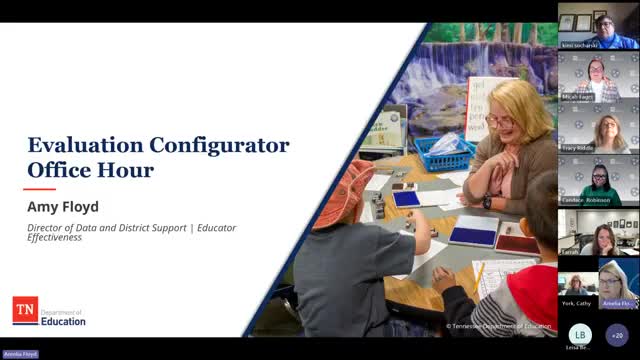Tennessee DOE office hour: how districts should finalize 2023–24 evaluations, mark partial‑year exemptions in TNCompass
Get AI-powered insights, summaries, and transcripts
Subscribe
Summary
Amy Floyd, director of data and district support at the Tennessee Department of Education, told district evaluation configurators during a department office‑hour session that administrators must complete and PIN 2023–24 evaluations in TNCompass before educators can sign them and that educators who do not provide 120 days of instruction should be marked as receiving a partial‑year exemption (PYE).
Amy Floyd, director of data and district support at the Tennessee Department of Education, told district evaluation configurators during a department office‑hour session that administrators must complete and PIN 2023–24 evaluations in TNCompass before educators can sign them and that educators who do not provide 120 days of instruction should be marked as receiving a partial‑year exemption (PYE).
The guidance explained the administrator PIN workflow in TNCompass: an administrator enters their PIN on the educator’s evaluation page and clicks “complete the form.” If the educator is unavailable to sign, the administrator can select a reason—such as “declined,” “on leave,” “no longer employed,” or “signature on file”—and save that status so the educator’s record shows why a signature is missing.
Why this matters: marking and pinning evaluations correctly in TNCompass determines whether a local observation evaluation (LOE) will generate and whether pacing and other reporting features appear for an educator. For educators marked PYE, no LOE is produced for that year and upcoming‑year pacing uses prior‑year data, department staff said.
Floyd walked through practical steps LEAs should follow: verify administrators have completed PIN signing (the Evaluation Scores by Educator report, columns P–V, show administrator and educator signature status); upload any missing observation or achievement data so an LOE can generate; monitor fall observation pacing (columns M–V on the pacing report show required observations by category and how many have been met); and update LEA contact information in TNCompass (Administration → LEA settings → Contacts).
State policy and partial‑year exemptions: Floyd said the PYE guidance comes from state board policy. She explained common PYE scenarios: educators employed under short‑term contracts or fewer than 120 days of instruction; full‑time educators who spend an extended leave and therefore do not reach 120 days; educators who transfer midyear and cannot provide 120 days to a single assignment or student group; or educators who change roles (for example, a teacher promoted to assistant principal at midyear and thus evaluated under a different rubric). Staff said districts may set PYE on an individual educator’s record or import many PYE flags using the TNCompass import wizard.
Questions from LEA staff focused on practical edge cases and support contacts. A participant who identified herself as Judy asked whether confirming a teacher now for K–2 universal reading screener verification would cause problems if the teacher later qualified for PYE; Tracy Riddle, director of educator effectiveness, answered that marking someone PYE later in TNCompass prevents scores and LOEs from generating, so confirming early does not harm a teacher’s record.
District staff also raised data‑management questions that the department directed to a separate state contact. Floyd and other presenters referred multiple salary‑coding and locked‑file questions to Karen Justice, the department staff member who manages the December 1 report and related statistical files; Floyd said Justice holds office hours and should be emailed for salary‑schedule unlocks and related corrections. Staff also advised LEAs to check TCRS (Tennessee Consolidated Retirement System) records when verifying years of experience.
Clarifying technical notes provided by department staff included which TNCompass report columns show pacing and signature details (pacing and requirements in columns M–V) and that fall observations should include at least one observation for every educator regardless of their LOE status. Floyd and colleagues recommended that evaluation configurators check and upload any missing observation or achievement data now so LOEs can generate where appropriate.
Department contact and resource guidance: Floyd listed TNCompass help resources and topic‑specific email addresses (team.questions for general TNCompass evaluation questions; portfolio questions for portfolio issues; rv.questions@tn.gov for roster verification; and the Tennessee universal reading screener and assessment contacts for those programs).
